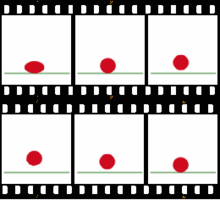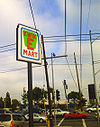Portal:Animation

| Main | Categories and topics | Tasks and projects |
Introduction
Animation is a filmmaking technique by which still images are manipulated to create moving images. In traditional animation, images are drawn or painted by hand on transparent celluloid sheets (cels) to be photographed and exhibited on film. Animation has been recognized as an artistic medium, specifically within the entertainment industry. Many animations are either traditional animations or computer animations made with computer-generated imagery (CGI). Stop motion animation, in particular claymation, has continued to exist alongside these other forms.
Animation is contrasted with live-action film, although the two do not exist in isolation. Many moviemakers have produced films that are a hybrid of the two. As CGI increasingly approximates photographic imagery, filmmakers can easily composite 3D animations into their film rather than using practical effects for showy visual effects (VFX). (Full article...)
Selected article
The Kwik-E-Mart is a fictional chain of convenience stores in the animated television series The Simpsons. It is a parody of American convenience store chains, like 7-Eleven and Circle K and represents many myths and stereotypes of them. It is notorious for its high prices and the poor quality of its merchandise. The operator of the Springfield branch is an Indian-American named Apu Nahasapeemapetilon. It was first seen in the episode "The Telltale Head" and since become a common setting in several episodes. In July 2007, eleven 7-Eleven locations in the United States and one in Canada were transformed into Kwik-E-Marts as part of a special promotion for the The Simpsons Movie. For a limited time, 7-Elevens across North America also sold various Simpsons products, such as "Squishees", "Buzz Cola" and "Krusty-Os cereal". Also in 2007, a gift stores named the "Kwik-E-Mart" was opened in Universal Studios Orlando and Universal Studios Hollywood, where they will be a companion to the upcoming "The Simpsons Ride".
Selected image
Did you know (auto-generated) -

- ... that the Tuca & Bertie episode "The Jelly Lakes" employs a paper-cutout animation that helps to depict abuse in a way that centers the victim's story?
- ... that the 1937 Fleischer Studios strike in New York City was the first major labor strike in the animation industry?
- ... that the live-action comedy series Community had a stop motion animated Christmas special?
- ... that the interactive cartoon Cat Burglar takes about 15 minutes to watch, but features 90 minutes of animation?
- ... that Bruce Timm created most of the character designs for Batman: The Animated Series?
- ... that although Blizzard's franchise Overwatch is centered around video games, its lore is mainly told through animated shorts, comics, and novels?
Selected quote
Selected biography
Isaac Lee Hayes, Jr. (1942-2008) was an American Grammy Award and Academy Award winning soul and funk singer, songwriter, musician, record producer, arranger, and actor. Hayes was one of the main creative forces behind Southern soul music label Stax Records, for which he served as both an in-house songwriter/producer and later as its premier recording artist. In addition to his work in popular music, Hayes has also written scores for several motion pictures as well. His best known film score, for the 1971 blaxploitation film Shaft, earned Hayes an Academy Award for Best Original Song (the first Academy Award received by an African-American in a non-acting category) and two Grammy Awards. Hayes received a third Grammy for his 1971 album Black Moses. In 1992, Hayes was crowned an honorary king of Ghana's Ada district thanks to his humanitarian deeds. From 1997 to 2006, he provided the voice for "Chef", a singing ladies' man and elementary school cook, on the animated sitcom South Park. There are conflicting statements from Hayes' publicists and others as to why he left the show, and this controversy is satirized in the South Park episode, "The Return of Chef".
Selected list
The episodes of The Bellflower Bunnies, a children's animated series based on the Beechwood Bunny Tales books by Geneviève Huriet, Amélie Sarn and Loïc Jouannigot. It debuted on TF1, a French television network, on 24 December 2001. The series is written by Valérie Baranski, and produced by Patricia Robert. The show centres on the adventures and exploits of the Bellflower family, a clan of seven rabbits who live in Beechwood Grove. The two adults in the family, Papa Bramble and Aunt Zinnia, take care of their five children: Periwinkle, Poppy, Mistletoe, Dandelion and Violette. The series has also been broadcast on CBC Television and TFO in Canada, KI.KA in Germany, Portugal's RTP in the Azores, and in several other countries. The show has fifty-two episodes: four in the first season, twenty-two in the second, and twenty-six in the third. In the entire series, thirteen are based directly on installments in Beechwood Bunny Tales, published by Milan Presse of France and Gareth Stevens in the United States; the rest are based on scripts by Valérie Baranski. Distributors in Europe, North America, and South Korea have released DVDs of the first two seasons.
More did you know...
- ...that Winsor McCay's animated film Gertie the Dinosaur (poster pictured) was originally created for a vaudeville act where McCay would seem to interact with the cartoon dinosaur?
- ...that Têtes à Claques was originally intended to be stop motion animation, but instead superimposed faces on the figurines to save time?
- ...that Lil' Pimp was the first feature-length film to be created entirely with Macromedia Flash animation?
Anniversaries for December 18
- Films released
- 1937 – September in the Rain (United States)
- 1942 – Bellboy Donald (United States)
- 1948 – Scaredy Cat (United States)
- 1954 – Touché, Pussy Cat! (United States)
- 1954 – Baby Buggy Bunny (United States)
- 1964 – The Pink Phink, the first original Pink Panther short was released by DePatie–Freleng Enterprises and United Artists. (United States)
- 1982 – Godmars (Japan)
- 1983 – Nine 2: Sweetheart Declaration (Japan)
- 1998 – The Prince of Egypt (United States)
- Television series and specials
- 1966 – How the Grinch Stole Christmas!, an American animated television special airs on CBS
- 1994 – Tico of the Seven Seas, an anime series ends on Fuji TV
- 2001 – Batman Beyond, an animated television series based on the DC Comics superhero as the same name ends on The WB
- 2004 – W.I.T.C.H., an animated television series debuts on France 3
- 2008 – Moral Orel, an American animated stop motion television series ends on Adult Swim
- Births
- 1946 – Steven Spielberg (pictured), American director
- Deaths
- 2006 – Joseph Barbera, American cartoonist (b. 1911)
Subportals
Related portals
Wikimedia
The following Wikimedia Foundation sister projects provide more on this subject:
 Commons
Commons
Free media repository Wikibooks
Wikibooks
Free textbooks and manuals Wikidata
Wikidata
Free knowledge base Wikinews
Wikinews
Free-content news Wikiquote
Wikiquote
Collection of quotations Wikisource
Wikisource
Free-content library Wikiversity
Wikiversity
Free learning tools Wiktionary
Wiktionary
Dictionary and thesaurus


















